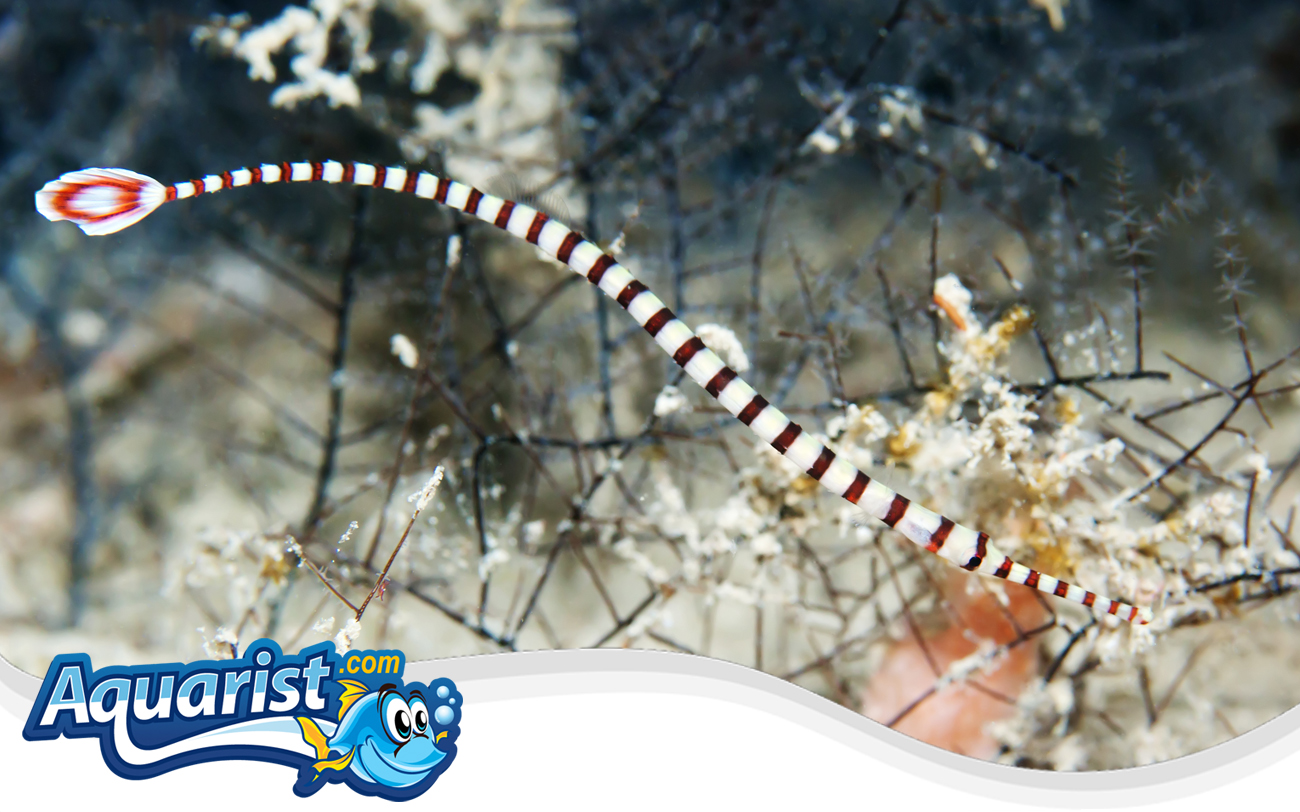Banded Pipefish (Doryrhamphus dactyliophorus)
Overview
The Banded Pipefish (Doryrhamphus dactyliophorus) is a striking marine species known for its elongated body, zebra-like bands, and fascinating swimming behavior. Closely related to seahorses, this pipefish exhibits a unique method of locomotion, gliding through the water with an almost hypnotic motion. These fish are commonly found in tropical reefs and lagoons, often weaving through coral branches or hiding within rock crevices.
They are highly specialized feeders and require careful attention in captivity. While their beauty and intriguing nature make them desirable, they are best suited for experienced aquarists who can provide the specialized care they need. These fish are incredibly delicate and require a well-maintained marine environment with stable conditions and an abundance of suitable food sources. They are best kept in species-specific setups or with carefully chosen tank mates to ensure they thrive.
Feeding
Banded Pipefish are obligate carnivores with a diet that primarily consists of small crustaceans, copepods, and live foods. Due to their small mouths and slow eating habits, they require a continuous supply of appropriately sized live food. Suitable food options include:
- Live copepods and amphipods
- Enriched brine shrimp
- Mysis shrimp
- Small marine worms
It can be challenging to wean them onto frozen food, but some individuals may accept finely chopped frozen mysis over time. Frequent feedings throughout the day are necessary to meet their dietary requirements. Feeding them only once or twice a day is insufficient, as they require constant access to food due to their high metabolism and slow hunting behavior.
A well-established refugium that produces live copepods is highly recommended for long-term success. Without a consistent food source, these fish can become malnourished and may not survive in captivity. Ensuring proper nutrition is a crucial aspect of their care and should not be overlooked.
Habitat
In the wild, Banded Pipefish inhabit coral reefs, seagrass beds, and sheltered lagoons across the Indo-Pacific. They prefer environments with plenty of hiding places, such as branching corals and caves, where they can find refuge from predators and strong currents. They often associate with cleaner shrimp and other small reef-dwelling creatures, forming unique ecological relationships.
To replicate their natural habitat in an aquarium, it is essential to provide ample live rock, caves, and low-flow areas where they can rest. Keeping them in a peaceful tank with limited strong water movement is ideal. A densely aquascaped environment with branching corals, sponge growth, and small crevices will help them feel more secure.
Fish Care
Maintaining a stable and high-quality marine environment is crucial for the health of Banded Pipefish. They are sensitive to fluctuations in water quality, so a well-established aquarium with proper filtration and consistent parameters is required. Since they do not compete well for food, they should be housed in a specialized setup where they receive adequate nutrition without competition from faster, more aggressive feeders.
Due to their fragile nature, it is recommended to introduce them into a mature tank with well-established biological filtration. They should be handled with extreme care when transferring to a new aquarium, as stress can negatively impact their health. These fish are prone to stress-related illnesses, including bacterial infections and parasites, making quarantine and acclimation essential steps in their care.
Water Parameters
To ensure the health of Banded Pipefish, maintain the following water conditions:
- Temperature: 75-80°F (24-27°C)
- pH: 8.1-8.4
- Salinity: 1.023-1.026 SG
- Ammonia & Nitrites: 0 ppm
- Nitrates: Below 10 ppm
- Water Flow: Low to moderate
Regular water testing and maintenance will help prevent stress-related health issues. A high-quality protein skimmer and efficient filtration system will aid in maintaining stable water conditions, ensuring the best environment for these delicate fish.
Compatibility
Banded Pipefish are peaceful and should be kept with non-aggressive tank mates. Suitable companions include:
- Seahorses
- Gobies
- Mandarins
- Small blennies
- Non-aggressive wrasses
Avoid housing them with large predatory fish, aggressive tank mates, or fast swimmers that may outcompete them for food. Fish such as triggers, aggressive tangs, and large angelfish are unsuitable companions. Additionally, reef aquarists should avoid keeping them with anemones or corals with strong stinging capabilities, as their slow movement makes them vulnerable.
Aquarium Behavior
Banded Pipefish exhibit slow, deliberate swimming patterns and are often seen weaving through rockwork and coral structures. They rely on camouflage to avoid predators, mimicking their surroundings to blend in. They do best in a calm environment where they can move freely without being disturbed.
These fish are known for their unique social behaviors, sometimes forming bonded pairs or small groups. When kept in pairs, they may exhibit courtship behaviors, including synchronized swimming and color changes. In captivity, observing these natural behaviors can be incredibly rewarding.
Conclusion
For aquarists looking for a unique and captivating species, the Banded Pipefish offers a rewarding challenge. Their striking appearance and interesting behavior make them a fascinating addition to a well-prepared aquarium.
However, their specialized care requirements mean they are not suitable for beginners. With the right setup, diet, and tank mates, these fish can thrive in captivity, providing years of enjoyment for dedicated marine hobbyists. Proper planning, stable water conditions, and a constant food supply are the key elements to ensuring success with this delicate but remarkable species.


